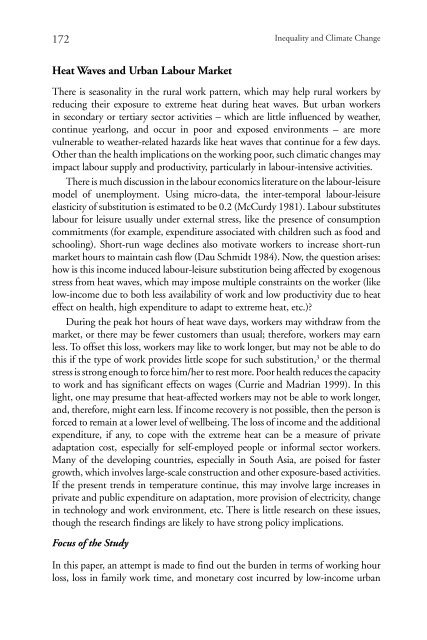Inequality and Climate Change Inégalité et changement climatique
Inequality
Inequality
Create successful ePaper yourself
Turn your PDF publications into a flip-book with our unique Google optimized e-Paper software.
172<br />
<strong>Inequality</strong> <strong>and</strong> <strong>Climate</strong> <strong>Change</strong><br />
Heat Waves <strong>and</strong> Urban Labour Mark<strong>et</strong><br />
There is seasonality in the rural work pattern, which may help rural workers by<br />
reducing their exposure to extreme heat during heat waves. But urban workers<br />
in secondary or tertiary sector activities – which are little influenced by weather,<br />
continue yearlong, <strong>and</strong> occur in poor <strong>and</strong> exposed environments – are more<br />
vulnerable to weather-related hazards like heat waves that continue for a few days.<br />
Other than the health implications on the working poor, such climatic changes may<br />
impact labour supply <strong>and</strong> productivity, particularly in labour-intensive activities.<br />
There is much discussion in the labour economics literature on the labour-leisure<br />
model of unemployment. Using micro-data, the inter-temporal labour-leisure<br />
elasticity of substitution is estimated to be 0.2 (McCurdy 1981). Labour substitutes<br />
labour for leisure usually under external stress, like the presence of consumption<br />
commitments (for example, expenditure associated with children such as food <strong>and</strong><br />
schooling). Short-run wage declines also motivate workers to increase short-run<br />
mark<strong>et</strong> hours to maintain cash flow (Dau Schmidt 1984). Now, the question arises:<br />
how is this income induced labour-leisure substitution being affected by exogenous<br />
stress from heat waves, which may impose multiple constraints on the worker (like<br />
low-income due to both less availability of work <strong>and</strong> low productivity due to heat<br />
effect on health, high expenditure to adapt to extreme heat, <strong>et</strong>c.)?<br />
During the peak hot hours of heat wave days, workers may withdraw from the<br />
mark<strong>et</strong>, or there may be fewer customers than usual; therefore, workers may earn<br />
less. To offs<strong>et</strong> this loss, workers may like to work longer, but may not be able to do<br />
this if the type of work provides little scope for such substitution, 3 or the thermal<br />
stress is strong enough to force him/her to rest more. Poor health reduces the capacity<br />
to work <strong>and</strong> has significant effects on wages (Currie <strong>and</strong> Madrian 1999). In this<br />
light, one may presume that heat-affected workers may not be able to work longer,<br />
<strong>and</strong>, therefore, might earn less. If income recovery is not possible, then the person is<br />
forced to remain at a lower level of wellbeing. The loss of income <strong>and</strong> the additional<br />
expenditure, if any, to cope with the extreme heat can be a measure of private<br />
adaptation cost, especially for self-employed people or informal sector workers.<br />
Many of the developing countries, especially in South Asia, are poised for faster<br />
growth, which involves large-scale construction <strong>and</strong> other exposure-based activities.<br />
If the present trends in temperature continue, this may involve large increases in<br />
private <strong>and</strong> public expenditure on adaptation, more provision of electricity, change<br />
in technology <strong>and</strong> work environment, <strong>et</strong>c. There is little research on these issues,<br />
though the research findings are likely to have strong policy implications.<br />
Focus of the Study<br />
In this paper, an attempt is made to find out the burden in terms of working hour<br />
loss, loss in family work time, <strong>and</strong> mon<strong>et</strong>ary cost incurred by low-income urban





